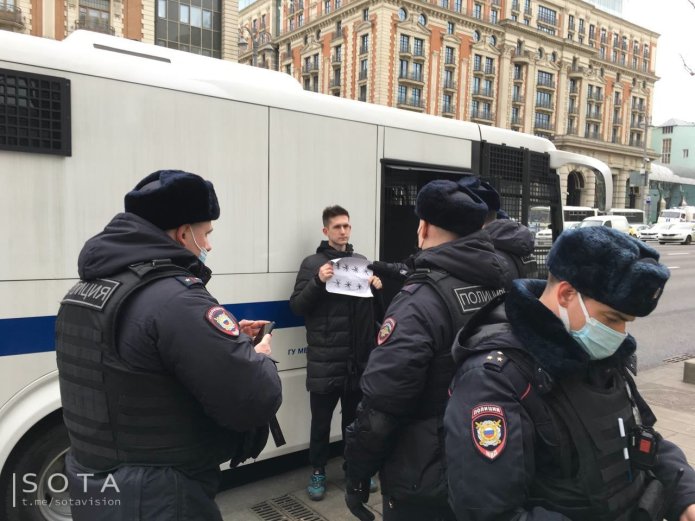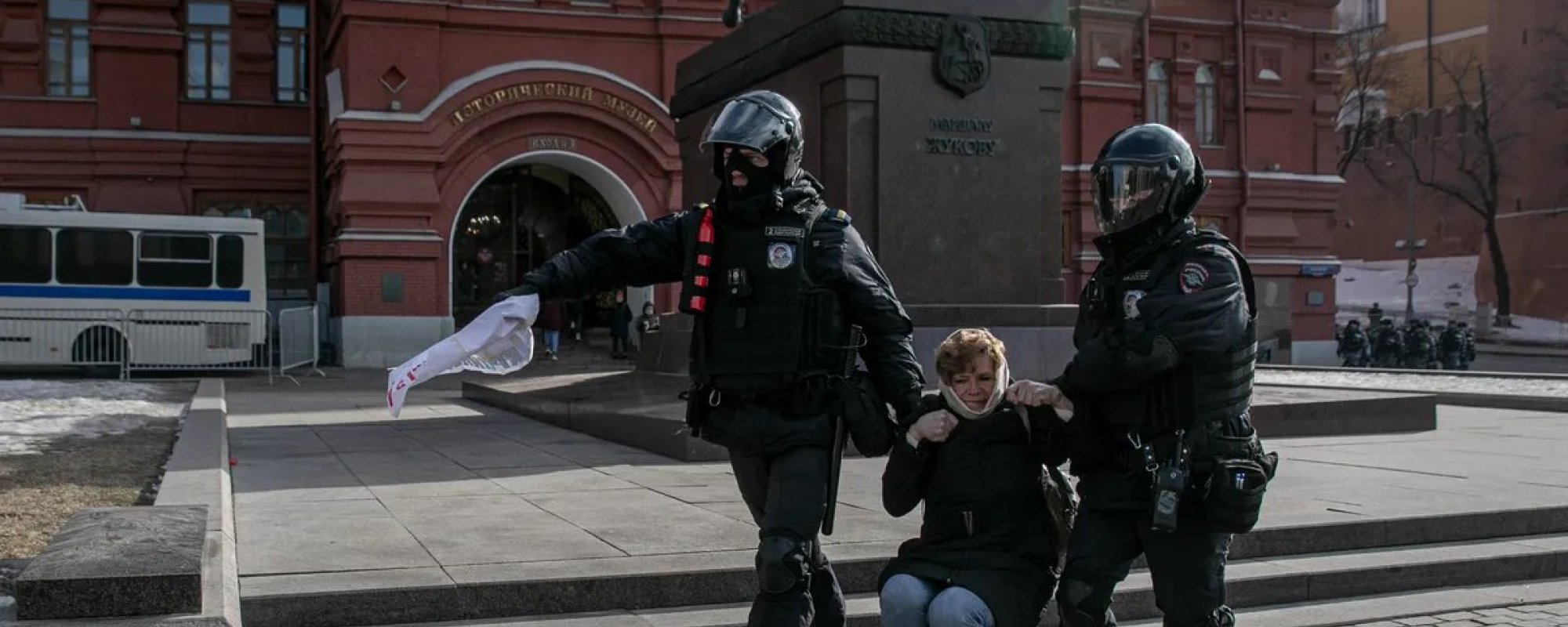On March 13th in 38 cities across Russia, more than 900 people were detained in anti-war demonstrations. Since the start of the war with Ukraine, nearly 15,000 people have been detained for their opposition to Russian aggression. The security services are not only throwing people into police vans for protesting, but are now trying to find «disloyal people» amongst passersby in places where anti-war protests have been announced.
Today OVD-Info’s lawyers helped detainees at police stations, we provided consultations to detainees through our Telegram bot and by phone, and also gathered and published information about detainees and violations of protestors’ rights in many cities throughout Russia. All of this was only possible thanks to you. Please support our work through donations with crypto!
Information on Detainees:
Detained: 919 people in 38 cities across Russia. Here is the list of people arrested, by region.
What they were charged with: violating the established procedures for participating in a public gathering (Part 5 of Article 20.2 of the Administrative Code), repeated violations of the established procedures for holding a public gathering (Part 8 of Article 20.2 of the Administrative Code), organizing or conducting a unauthorized public gathering (part 2 of Article 20.2 of the Administrative Code), organizing a «simultaneous mass presence or movement of citizens» resulting in violations of public order (Part 1 of Article 20.2.2 of the Administrative Code), disobeying a lawful order of the police (Article 19.3 of the Administrative Code), public activities aimed at «discrediting the use of Russia’s armed forces» (Article 20.3.3 of the Administrative Code), and violating public health restrictions (Article 20.6.1 of the Administrative Code).
Possible penalties: depending on the Administrative Code article, from 2,000 to 300,000 rubles and jail for up to 30 days. People who are convicted of violating the law on public activities aimed at «discrediting the use of Russia’s armed forces» (Article 20.3.3 of the Administrative Code) twice in one year are now subject to criminal prosecution.
Detentions of Protestors:
Moscow
Saint Petersburg
Ekaterinburg
Syktyvkar
Yaroslavl
Cheboksary
Ivanovo
Izhevsk
Belgorod
Vladivostok
How the Arrests were Conducted
-
In Izhevsk, protestors were arrested for singing a children’s song while walking in a ring
-
In Ufa, police took protestors away into nearby shuttle buses with license plates that were either blacked out or removed.
-
Natalia Lauve, who was arrested at a protest on March 6th, told OVD-Info that the security services came to her home–at that moment she wasn’t home, her mother opened the door. «They started to force open the door and woke up my mom. She said that I wasn’t home, and that I wasn’t going to ever go again [to another protest–OVD-Info]. They threatened that if I went to another protest, they’d open a criminal case against me» reported Lauve
-
A member of the «Golos» movement, Vitalii Averin was arrested at the Belorusskaya metro station right in the subway car.
-
In Moscow, with the help of the facial-recognition system, Nikita Maximov was detained at the exit to the metro for his participation in anti-war protests on March 6th.
-
Today, in the center of Moscow, at least two cyclists were detained. Police also took their bicycles into the police vans.
-
In Moscow, a man conducting a single-person anti-war protest has gone missing after being arrested on Manezh Square. His wife reported it to OVD-Info, asking that we not use any names. According to the wife, they took his phone and wrote to her pretending to be him, but notably, they wouldn’t pick up the phone when she called.
-
In Moscow, someone drew the letter «Z» all over the entryway of activist Gleb Kondratiev’s apartment and beat up his friend. He wrote about this on Twitter. He told OVD-Info that the people who approached his friend showed police identification cards, and turned off the electricity to the apartment from the electrical panel in the entryway. After they entered the apartment, they smashed electronic equipment and beat up the occupants. «My friend was the one who was standing in front, and he was hit in the face right away, they threw him to the floor and beat him, ” said Kontratiev. As a result, the young man was taken away in an ambulance.
Violations of Detainees’ Rights
-
Arrests are frequently conducted aggressively: for example, detainees frequently have their arms twisted. At the time of publication, we do not have exact numbers for how many people were beaten at the March 13th protests. Here is one (hopefully rare) example: Anastasia Kotlyar from Vladivostok «They threw me in a strange little bus that was in between all the other buses, where they had their desk. Some of the police officers left and then another one came up to me and called me a «bitch, ” hit my head against the table and started to choke me…Some other police officers approached and he took off. Then they took us to the station.»
-
We are receiving more and more reports that police are demanding that passersby unlock their phones and show the police their text messages and saved photographs. For the most part, this seems to be happening in places where law enforcement think there is going to be an anti-war protest.
-
People are increasingly being detained for wearing green ribbons (the symbol of the anti-war protests), flowers, pins, hats and other pieces of clothing that make police think of Ukraine’s yellow and blue flag.
-
Police are increasingly trying to take the phones of detainees in police vans. At police stations, people have been forced to give fingerprints and to take photographs for police files.
-
Law enforcement is taking the broadest possible interpretation of all civic activity as anti-war. They are detaining people for holding up blank pieces of paper, pieces of paper where there are asterisks instead of letters, and slogans like «I have the right to my opinion» or «Grandpa, take the pills.» Stickers on cars reading «No to War in Ukraine» are considered to be discrediting the Russian military.

-
People who are considered potential participants in anti-war protests are not only being arrested where the activities are supposed to take place.
-
At the time of publication, we do not have precise data on the number of journalists who have been detained. On Nevsky Prospekt in St. Petersburg, nine journalists from various media outlets were detained (and then released) for filming arrests. The editor of Kommersant Alexander Chernykh wrote on his Telegram channel that he was hit twice by police on Manezh Square in Moscow.



